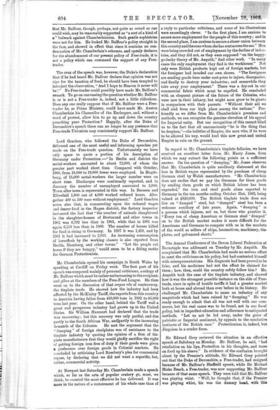Lord Goschen, who followed the Duke of Devonshire, delivered one
of the most useful and informing speeches yet made on the Free-trade question. Unfortunately we have only space to quote a portion of his description of Germany under Protection :—" In Berlin and district the metal-workers amounted to about 72,000, of whom the greater part worked short time. Compared with October, 1900, from 18,000 to 19,000 fewer were employed. In Magde- burg, of 15,000 metal-workers the larger number were on short time. Discharges were continually reported, and in January the number of unemployed amounted to 2,000. Town after town is represented in this way. In Barmen and Elberfeld 1,800 out of 4,000 worked reduced hours. Alto- gether 400 to 500 were without employment." Lord Goschen notes also that, in commenting upon the reduced wages and dearer food in the Hagen district, the factory inspector instanced the fact that "the number of animals slaughtered in the slaughter-houses of Dortmund and other towns in 1902 was 6,792 less than in 1901, while that in 1901 was again 6,559 less than in 1900. The number of horses killed for food is rising in Germany. In 1897 it was 1,419, and by 1901 it had increased to 2,055. An increasing consumption of horseflesh by the working classes is also reported from Berlin, Hamburg, and other towns." "Let the people eat horse if they are hungry," would seem to be a fitting motto for German Protectionists.


















































 Previous page
Previous page